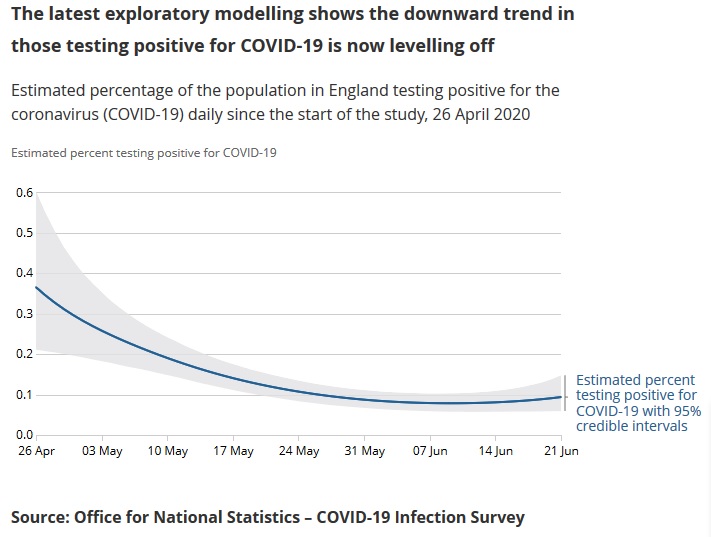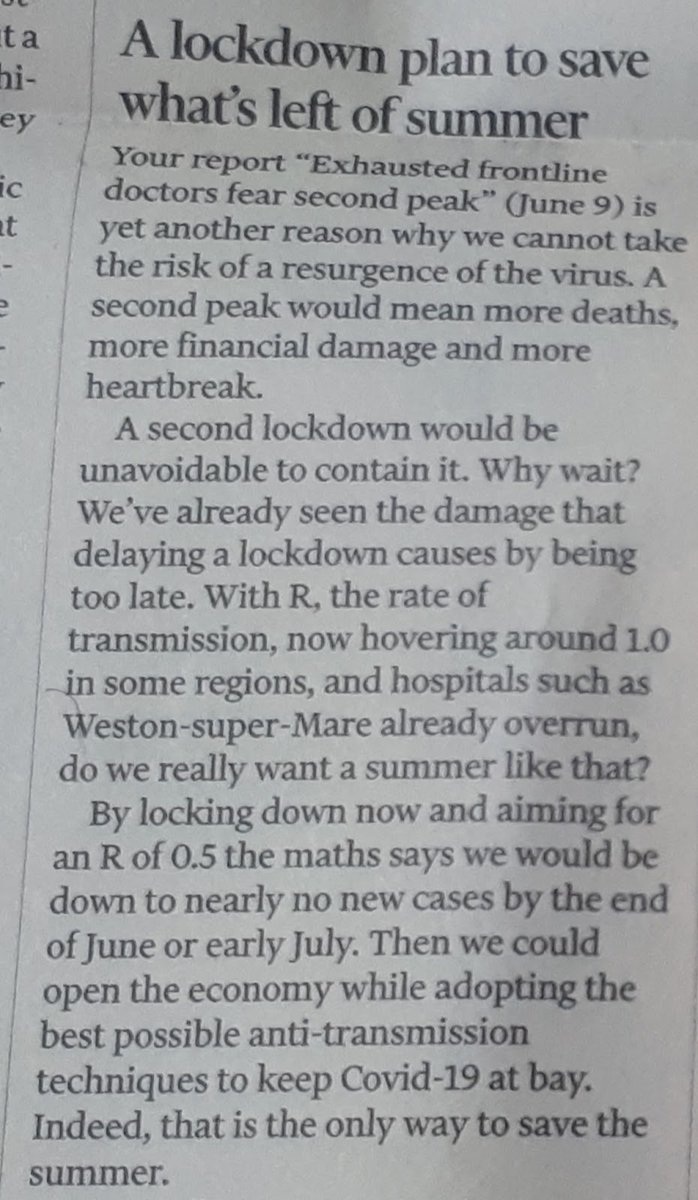UPDATE ON COVID-19 INFECTIONS FROM THE ONS
On Tuesday 23 June PM Johnson announced that COVID-19 infections in England had dropped to 1 in 1700, and that various easings could take place as planned on 4 July.
1 in 1700 is equivalent to 0.06% of the population in England.
1/n
On Tuesday 23 June PM Johnson announced that COVID-19 infections in England had dropped to 1 in 1700, and that various easings could take place as planned on 4 July.
1 in 1700 is equivalent to 0.06% of the population in England.
1/n
With 0.06% in mind, Matt Hancock announced at the press briefing last Thursday 18 June that the “…ONS’s (Office for National Statistics) survey... implies around 4.5 thousand new cases per day”
https://www.gov.uk/government/speeches/health-and-social-care-secretarys-statement-on-coronavirus-covid-19-18-june-2020
2/n
https://www.gov.uk/government/speeches/health-and-social-care-secretarys-statement-on-coronavirus-covid-19-18-june-2020
2/n
Today Thursday 25 June the ONS has announced that “The decrease in the number of people in England testing positive for …COVID-19 has levelled off.”
However the graph accompanying the statement shows infections have steadily risen from 0.06% to 0.1% in the last fortnight
3/n
However the graph accompanying the statement shows infections have steadily risen from 0.06% to 0.1% in the last fortnight
3/n
That implies:
•R has been over 1.0 for more than 2 weeks, not in the range 0.7-0.9
•Around 6,900 people per day are being infected in England
Here's the announcement:
https://www.ons.gov.uk/peoplepopulationandcommunity/healthandsocialcare/conditionsanddiseases/articles/coronaviruscovid19roundup/2020-03-26#infectionstudy
4/n
•R has been over 1.0 for more than 2 weeks, not in the range 0.7-0.9
•Around 6,900 people per day are being infected in England
Here's the announcement:
https://www.ons.gov.uk/peoplepopulationandcommunity/healthandsocialcare/conditionsanddiseases/articles/coronaviruscovid19roundup/2020-03-26#infectionstudy
4/n
The ONS survey also says “Our latest estimates for 8 to 21 June 2020, suggest an average of 51,000 people in England had COVID-19, an increase from an average of 28,000 in the previous period, 25 May to 7 June 2020.”
These are averages. 0.06% is c33,000, 0.1% is c55,500.
5/n
These are averages. 0.06% is c33,000, 0.1% is c55,500.
5/n
6,900 a day from the ONS is significantly higher than the 1000-1200 figures being mentioned on the BBC and other media. These reflect the 7-day rolling average to 23 June derived from official testing of 1,147.
6,900 is also substantially higher than the 653 on 24 June.
6/n
6,900 is also substantially higher than the 653 on 24 June.
6/n
This is for several reasons, including:
• Not everybody with symptoms gets tested
• Not everybody sent a test returns it
• False negatives are up to 40%, due primarily to poor swabbing
The ONS survey is more representative, although the confidence interval is a concern.
7/n
• Not everybody with symptoms gets tested
• Not everybody sent a test returns it
• False negatives are up to 40%, due primarily to poor swabbing
The ONS survey is more representative, although the confidence interval is a concern.
7/n
With R already over 1.0, we’ve already got a second wave. It would be inadvisable to go ahead with the easings on 4 July, which would only stoke the flames.
Indeed the government needs to seriously consider a second lockdown to nip the wave in the bud.
8/n
Indeed the government needs to seriously consider a second lockdown to nip the wave in the bud.
8/n
After all, PM Johnson did say on Tuesday, as he has said before, that easings would be reversed if necessary.
That can’t be an empty promise. It is in everyone's interest to avoid a catastrophe.
9/n
That can’t be an empty promise. It is in everyone's interest to avoid a catastrophe.
9/n
Professor Whitty, Chief Medical Officer for England, said back before the first easings on 11 May, that daily infections should be below 1,000 before easings are made.
https://www.dailymail.co.uk/news/article-8276173/Ministers-warn-lockdown-stay-MONTHS-new-cases-drop-hundreds.html
10/n
https://www.dailymail.co.uk/news/article-8276173/Ministers-warn-lockdown-stay-MONTHS-new-cases-drop-hundreds.html
10/n
Spain, France and Germany are all half of that threshold, with similar populations.
They are only easing lockdown carefully with significant anti-transmission measures such as wider use of face coverings.
It is nonsense for UK to be considering such easings yet.
11/n
They are only easing lockdown carefully with significant anti-transmission measures such as wider use of face coverings.
It is nonsense for UK to be considering such easings yet.
11/n
The first lockdown reduced daily cases by 86% in just three weeks. That is consistent with an R of 0.4-0.5. So that is what is needed
Use that time to develop a stronger set of anti-transmission measures, and lockdown could be substantially released then, far more safely
12/n
Use that time to develop a stronger set of anti-transmission measures, and lockdown could be substantially released then, far more safely
12/n
So those two recommendations were what were published in the Financial Times on 11 June.
We’ve lost 2 weeks, but not too late to save the summer
Implemented in England by next Monday 29 June, we could be re-opening by 17 July, only two weeks after the 4 July target.
13/n
We’ve lost 2 weeks, but not too late to save the summer
Implemented in England by next Monday 29 June, we could be re-opening by 17 July, only two weeks after the 4 July target.
13/n
A key aspect of easing lockdown is public confidence.
Many parents have not been confident enough to send their kids back to school, when they were encouraged to do so. People say they won’t get on planes, or even visit the shops. Loos and cafes need to be open.
14/n
Many parents have not been confident enough to send their kids back to school, when they were encouraged to do so. People say they won’t get on planes, or even visit the shops. Loos and cafes need to be open.
14/n
Get infections down by 86% and people will be far more confident. Happier to go to the shops. More confident about their jobs. Happier to spend. Meaning a stronger economic recovery
Better for the economy. Better for the Treasury.
A second lockdown is good for us.
15/n
Better for the economy. Better for the Treasury.
A second lockdown is good for us.
15/n
We should also be mindful that a lower rate of infection means far fewer deaths. With widespread reports of major health problems for those people who survive, these would be a far lower too.
Saving the summer. Saving the economy. Saving lives and livelihoods.
16/n
Saving the summer. Saving the economy. Saving lives and livelihoods.
16/n
With infections now on the rise, a short sharp second lockdown is imperative.
Isn’t it?
17/n
Isn’t it?
17/n

 Read on Twitter
Read on Twitter



